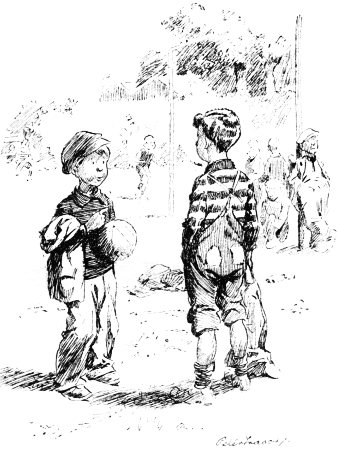
"Who's Bill 'Iggins playin' for this season?"
"Oh, 'e ain't signed on yet, but we've offered him first suck at the lemon."
The Project Gutenberg EBook of Punch, or the London Charivari, Vol. 159, September 22, 1920, by Various This eBook is for the use of anyone anywhere at no cost and with almost no restrictions whatsoever. You may copy it, give it away or re-use it under the terms of the Project Gutenberg License included with this eBook or online at www.gutenberg.org Title: Punch, or the London Charivari, Vol. 159, September 22, 1920 Author: Various Editor: Owen Seaman Release Date: January 31, 2006 [EBook #17653] Language: English Character set encoding: ISO-8859-1 *** START OF THIS PROJECT GUTENBERG EBOOK PUNCH, OR THE LONDON *** Produced by Jonathan Ingram, Lesley Halamek and the Online Distributed Proofreading Team at http://www.pgdp.net
"'Strike while the iron is hot' must be the motto," says a business man. Mr. Smillie, on the other hand, says that it doesn't so much matter about the iron being hot.
A curious story reaches us from the Midlands. It appears that it had been decided to call out the workmen in a certain factory, but the strike-leader had unfortunately mislaid his notes and could not remember their grievance.
Mr. C.B. Cochran has decided to have nothing further to do with the promotion of boxing-matches owing to the way in which contracts are continually being broken. It has since been reported that several of our leading professional boxers are endeavouring to arrange a farewell disappointment.
Mr. Evans, the American golf champion, has invented a new putter. We appreciate America's effort, but all the same we cannot forget her apathy toward the League of Nations.
Last week the largest number of Alpinists ever assembled met on the top of the Matterhorn. If this sort of thing goes on it is quite likely that the summit will have to be strengthened.
Colder weather is promised and the close season for Councillor Clark should commence about October 1st.
"The ex-Kaiser," says The Western Morning News, "goes in daily fear of being kidnapped." This is said to be due to the presence at Amerongen of an enterprising party of American curio-hunters.
A headline in a weekly paper asks, "What will Charlie Chaplin Turn out this Year?" "His feet," is the answer.
The language at Billingsgate, according to Sir E.E. Cooper, is much better than it used to be. Fish porters invariably say "Excuse me" before throwing a length of obsolete eel at a colleague.
In the event of a miners' strike arrangements have been made for the staff of the Ministry of Transport to sleep at the office. It would be more wise, we think, if they remained wide awake.
A feature of the new motor charabanc will be the space for passengers' luggage. This is just what is wanted, as it so easily gets broken even if the corks don't come out.
A message from Allahabad states that the appointment of Mr. Winston Churchill as Viceroy of India would be very popular. Unfortunately they omit to say where it would be popular.
"Drink is Scotland's greatest sin," said a Prohibitionist speaker at Glasgow. The gentleman does not seem to have heard of haggis.
Asked what he would have, a Scotsman, taking advantage of its high price, replied, "A small petrol, please."
The National Gallery with its three thousand pictures is practically priceless, we are informed. This probably accounts for the fact that the hall-porter invariably takes visitors' umbrellas as security.
What is now wanted, says a contemporary, is a good spell of fine weather. We feel that no good can be done by rubbing it in like this. The Daily Mail is doing its best.
We understand, by the way, that The Daily Mail has definitely decided not to offer a prize of a hundred pounds for a new world, but to leave the matter entirely in the hands of Mr. Lloyd George.
The Astronomical Correspondent of The Times suggests that the new star may have been produced through a sun being struck by a comet. This raises the question as to whether suns ought not to carry rear lights.
There is some talk of a series of week-end summers being arranged for next year.
"If necessary I will walk from John-o'-Groats to Land's End, distributing propaganda literature all the way," announced a well-known strike agitator at a recent conference. Personally we do not mind if he does, provided that when he reaches Land's End he continues to walk in the same direction.
According to a weekly journal the art of camouflage played a most important part in recent naval warfare. It is, of course, quite an open secret that the Naval authorities are aware that one of our largest Dreadnoughts is somewhere in a certain English harbour, but, owing to the excellence of its camouflage, they have not yet been able to locate it.
We now learn that it was merely through an oversight that the pit ponies did not record their votes at the strike ballot.

"Who's Bill 'Iggins playin' for this season?"
"Oh, 'e ain't signed on yet, but we've offered him first suck at the lemon."
"Shamming death, he moaned loudly."—Irish Paper.
"'The Seven Deadly Sins.' Frederick Rogers.
This is a subject that Mr. Rogers is eminently fitted to explore."—Review of Reviews.
"Tenor wanted, to join bass; must have voice."—Scotch Paper.
Some people are so exacting.
"Bride in apricot."—Daily Paper.
A new significance is added to the calculation of one's fruit stones—"This year, next year, some time, never."
[A final salutation to the M.C.C. team, from one who is destined to perish in the event of a coal strike.]
O ship that farest forth, a greater Argo,
Unto the homeland of the woolly fleece,
Soft gales attend thee! may thy precious cargo
Slide over oceans smoothed of every crease,
So as the very flower, or pick,
Of England's flanneled chivalry may not be sick!
And thou, O gentle goddess Hygieia,
Hover propitious o'er the vessel's poop;
Keep them from chicken-pox and pyorrhœa,
Measles and nettle-rash and mumps and croup;
See they digest their food and drink,
And land them, even as they leave us, in the pink!
Thou, too, whose favour they depend so much on
(Fortune, I mean) in this precarious game,
Oh let there be no blob on their escutcheon,
Or, if a few occur, accept the blame;
Do not, of course, abuse thy powers;
We'd have the best side win, but let that side be ours.
Summer awaits them there while we are wheezing
By empty hearths through bitter days and black;
Yet we rejoice that, though we die of freezing
And cannot get cremated, all for lack
Of coal to feed our funeral pyres,
Still "in our ashes [yonder] live their wonted fires."
O.S.
"As you are aware," said a prominent official of the Ministry of Ancestry, "although our department has only been in existence for a few months the profits have enabled the Government to take twopence off the income-tax and to provide employment for thousands of deserving clerks dismissed, in deference to public opinion, from other Government offices."
"Yes. Could you tell me how this brilliant scheme came into being?"
"The Chinese knew and practised it for centuries. Here the credit for its re-discovery must be assigned to Sir Cuthbert Shover, who, owing to handsome contributions to necessary funds, combined, of course, with meritorious public service during the War, was offered a baronetcy. He refused it for himself, but accepted it for his aged father, thereby becoming second baronet in three months. He deplored the fact that his grandfather was no longer eligible for the honour. Then we saw light. Why should the mere accident of death prevent us from honouring a man if his family were prepared to contribute towards the country's exchequer? But these letters will give you a clearer insight into the working of the department."
The first letter was addressed to Miss Cannon, at Maidstone:—
"Dear Madam,—We have no hesitation in advising you to have a bishop in your family. Few purchases give greater satisfaction. If, as you say, your late maternal grandfather was curate of Slowden, and was, as far as you are aware, a man of exemplary character, we could make him a bishop without delay. Your home being in Kent, it occurs to us that the see of Carlisle would suit the Right Reverend Prelate best. The cost of the proceedings, including a pre-dated Congé d'Élire, would be eight hundred guineas. An archbishopric would be slightly more expensive and, in our opinion, less suitable."
"Amazing," I said.
"But so simple. Here is a letter from a man who wants to have had forbears in the Navy. We say:—
"'Naturally it would have been an advantage for your son, whom you destine for the Navy, to have had relations in that service. But it is not too late to remedy this defect.
"'By virtue of the powers conferred upon us by Act of Parliament (Ancestry Act, 1922), we are prepared to give your sometime great-great-uncle William, who, according to family tradition, always wanted to go to sea, a commission in the Navy, and the rank of lieutenant, together with appointment to any ship of the line—with the exception of the Victory—which fought under Lord Nelson. The making out the commission will be put in hand on the receipt of your cheque for three hundred guineas.'"
"Do you always give satisfaction?"
"Occasionally we have to disappoint people. For instance, this letter to a lady at Plymouth:—
"'We fear we cannot grant your request to reserve a berth on the Mayflower for your delightful ancestress, Mrs. Patience Loveday. The Mayflower is already overcrowded, and, owing to some ill-feeling raised in America, we decided to resign all interest in the vessel. Should you desire some other form of Puritan distinction how would you like to provide yourself with a non-juring clergyman as an ancestor? We could present any suitable departed member of your family to a Crown living, and supply you with an order of ejectment, dated the anniversary of St. Bartholomew's Day, 1662.'"
"Judging from the address on this letter, 'X. O'Finny, Esq.,' your jurisdiction extends to Ireland?"
"Yes, Mr. O'Finny wants some persecuted ancestors. We offer to supply him with a member of his family condemned to be beheaded by order of Queen Elizabeth, price one thousand, which includes a replica of the Great Seal of England; or, to have another member shot by order of Cromwell, at half the price; or a sentence of hanging in '98. This would be three hundred only. We advise him to take the complete set at a reduction, and have no doubt we shall come to terms."
"Have you anything more expensive?" I asked timidly.
"Rather. Here is our answer to Lord—better not give the name, perhaps; the creation is recent. He wished for a Crusader, but we explained that the Crusades were not under Government. We offer to introduce his family name into our authorised supplement to the Domesday Book for five thousand pounds. I call it cheap at the money. Now what can we do for you?"
"I must think it over," I stammered.
"Do. You will come back. Pair of Colours, now, for a great-great-grandfather. How would that suit you? Only five hundred. Or a place at Court in the Regency? Or, if you wish good business connection, a directorship of the East India Company? The whole of the past lies before you. Give your children a fair start in life, that is what we say. Money is good, education is better, but distinguished ancestry is best of all."
"The breeches on the line between Sini and Jhursagudha have now been repaired."—Civil and Military Gazette.
"The King has given Mr. William Armstrong, Director of Criminal Intelligence of the Shanghai Municipal Police, authority to wear the Insignia of the Fourth Class of the Order of the Excellent Crop, conferred on him by the President of the Republic of China, in recognition of valuable services."—Times.
We understand that extreme shortness of hair is not the hall-mark of the Chinese criminal world.
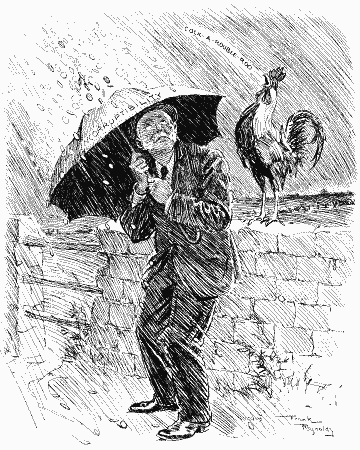
Comrade Lansbury. "THANKS TO MY FAITHFUL BROLSKI NOT A DROP HAS TOUCHED ME."
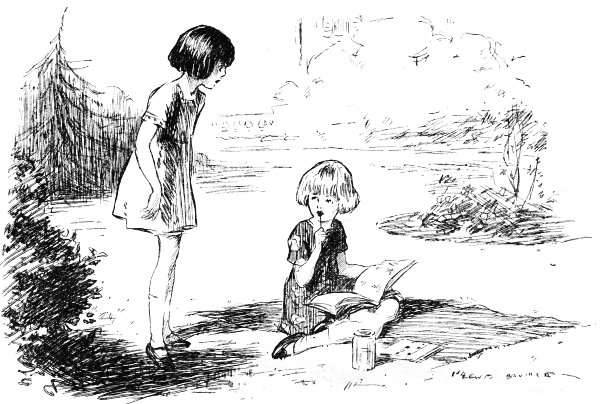
Horrified Sister (to small artist). "Mabel, you're surely not sucking your brush when you're painting toadstools?"]
There are thirty-six of them in all, ranging from William I., who is "severe," to Victoria, who is just "good." I first made their acquaintance in childhood, when my grandmother gave them me with the laudable object of teaching me history. Each is a little wooden block signifying a monarch. On one side there is a portrait showing the face, collar and upper portion of torso of the monarch in question; on the other side there is written a single word summing up his whole character.
By means of these royal blocks I was brought up to a sound historical sense based on religion and morality. At the age of seven I could and did boast that I knew the innermost souls of all the monarchs of England. I could say their dates by heart, often doing so during sermon time on Sundays, with a grace and ease that only lifelong acquaintance with royalty could have bred. I was even able to triumph through that tricky period between the death of Edward III. and the accession of Elizabeth. I wonder if the late Lord Acton was as learned at that age: I am sure he could not say his dates backwards. I could.
It has always surprised those who have endeavoured to teach me history that my youthful brain should be so strongly grounded in the historical tradition of over half a century ago. Yet all the historians of modern England could not shake me in my faith. To me Queen Victoria was no "panting little German widow," as our latest searcher after truth has affirmed, but the august lady who listened entranced to the beautiful poems of Lord Tennyson and invented electricity and the tricycle. In consequence I was considered a counter-revolutionary, if not bourgeois. My essays were deemed dangerously reactionary. At Oxford I once found my tutor burning one. This shows the value the authorities attach to my work. It is too dangerous to live; it is burnt.
I venture to think, however, that my work, based as it is on the most respectable principles, will survive long after my tutors have subsided into a permanent state of death in life. Like Shakspeare and the present Government I am for all time.
It is easy to see how I came to acquire this stability of thought, owing as I do my early training to the kings and queens of England, who are nothing if not stable. They are my acknowledged guardians and to them I turn in all difficulties. Only a year ago they came to my aid in a most awkward predicament. It was my lot to fill up army forms; of what variety I cannot remember save that they were of a jaundicy colour and connected with the men's demobilisation. On these documents I was expected to enter, besides the usual details as to religion and connubial felicity, the character of each man in a single word. I at once marshalled my wooden royalties before me in chronological order and proceeded to deal with the squadron in rotation.
The first name on my list was that of the disciplinary sergeant-major. It was with a glow of pride that I registered him with William I. as "severe." The designation of Tonks, the Mess waiter (whom we had discovered on the night the bomb fell on the aerodrome making a home and a house of defence in the cookhouse stove), as "heroic" was distinctly happy. It was perhaps unfortunate that the quartermaster-sergeant, an austere man from Renfrew, should have found, on perusing his demobilisation card, that he was to be handed down to posterity as "avaricious." I was also sorry to find the padre, usually so broad-minded, in a nasty temper about the character given to his batman, who was, he assured me, the only pious man in the squadron and in private life a dissenting minister. "Dissolute" certainly was on the face of things inappropriate, but then it was [pg 225] no fault of mine that the merriest of English monarchs should have appeared at the moment when I was filling up the papers of a minister of religion.
The light that my wooden monarchs throw on history is both interesting and, to a modern, precious. For instance, the designation of the first Angevin king as "patriotic" will surprise many readers of the late Bishop Stubbs. "Patriotic" is a wide term and may be applied to almost anything from after-dinner flag-wagging to successful juggling with Colonial stocks and shares; yet there are few who would have described it as the besetting virtue of Henry I. But it was; his little block says so.
John, again, was "mean." I am sorry, for, though in some respects blameworthy, he had many agreeable traits. His views on the honesty of his baronage are most entertaining. He was something of a wit, a good judge of food and wine, and would have made an excellent Fellow of an Oxford college. It is much to be regretted that he was mean.
Poor Henry VI. is "silly." This is a hard judgment on the pioneer of the movement against low backs in evening frocks, but doubtless he was silly in other things.
Some of my monarchs had the most excellent characters. Edward I. was "just," George IV. "courteous," Oliver Cromwell "noble"—a sad blow for the White Rose Club. Our younger monarchs were particularly attractive persons, and it is a pity that they did not live long enough to display their qualities. Edward VI. was "amiable," while Edward V., like all with expectations from their uncle, was "hopeful." Poor child! he had need to be.
I am pained however that Charles II. was "dissolute." It was what Henry VIII. dissolved the monasteries for being—the impertinent old polygamist! For my part I love Charles for the affection that he bore little dogs, for the chance saying on Sussex hills that this England was a country well worth fighting for. Alas! that he should have been dissolute.
Best of all my friends is George III. He is portrayed with a jolly red nose and a mouth that positively yawns for pudding. His character, which is his chief glory, is "benevolent." Who would not rejoice to have been the object of his regal philanthropy? Samuel Johnson himself did not hesitate to accept the bounty of this kindly monarch, though, while his predecessor reigned, the great lexicographer had defined a pensioner as "a state hireling" paid "for treason to his country."
Such are my friends the kings and queens of England. Happy the child who has such majesty to be his guardian spirit. To him life will be a pomp, where vulgar democracy can have no part, and death a trysting-place with old comrades—the child for whom
"The kings of England, lifting up their swords,
Shall gather at the gates of Paradise."
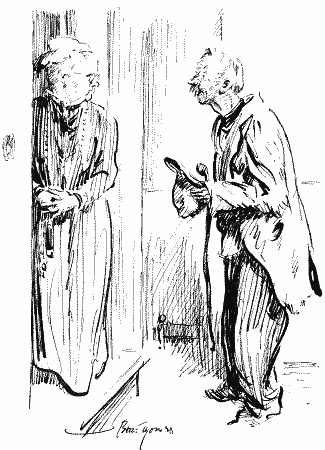
The Super-Tramp. "Madam, if you have any more of that pie you gave me this morning I should be pleased to pay for it."
My fancy sought no English field,
What time my holiday drew near;
I felt no fond desire to wield
The shrimping net of yesteryear;
I found it easy to eschew
All wish to hear a pierrot stating
His lust to learn the rendezvous
Of flies engaged in hibernating.
Beyond the Channel I would range
(I called it "cross the rolling main")
And there achieve the thorough change
Demanded by my jaded brain;
It might be that an alien clime
Would jog a failing inspiration,
Buck up a bard and render rhyme
Less difficult of excavation.
A thorough change? Ah, barren quest,
Foredoomed to fail ere half begun!
Though left behind, my England pressed
In hot pursuit of me, her son;
London was brought again to view
By hordes of maidens out for pillage,
When from the train I stepped into
A flag day in an Alpine village.
This was the telegram that, after much hesitation, I had written out at the side desk in the post-office and carried to the main desk to despatch:—
Pactolus, London.
St. Vitus carburetter stammer tyre scream
Sanguine.
You will observe that it is unintelligible. Decoded, it meant that I, whose betting pseudonym is Sanguine, wished to invest with Messrs. Lure, commission agents (not bookmakers, no, not for a moment), whose telegraphic address is "Pactolus, London," a sum of ten pounds (carburetter) on a horse called St. Vitus to win (stammer), and twenty pounds (tyre) for a place (scream). I had done this for various reasons, none really good, but chiefly because every paper that I had opened had urged me to do so, some even going so far as to dangle a double before me with St. Vitus as one of the horses. Nearly all had described St. Vitus as a nap, setting up the name not only in capitals but with a faithful asterisk beside it.
Having an account with Messrs. Lure and a liking now and then to indulge in a little flutter over a gee (I am choosing my words very carefully) I had decided, after weighing the claims of all the other runners, to take the advice of the majority and back the favourite, although favourites acclaimed with stridency by the racing experts of the Press in unison have, I knew, a way of failing. In betting on races, however, there are two elements that are never lacking: hope against hope and an incomplete recollection of the past.
Having written out the telegram I took it to the main counter, to the section labelled "Telegrams," and slipped it under the grating towards the young woman, who, however, instead of dealing with it, continued to tell an adjacent young woman about the arrangements that she and a friend had made for their forthcoming holidays at Herne Bay.
The nature of those who have little flutters on gees is complex. The ordinary man, having written out his telegram, on whatever subject it may be—whether it announces that he will arrive before lunch and bring his clubs with him, or that, having important business to detain him at the office, he will not be home to dinner—gets it through as soon as possible. He may be delayed by the telegraph girl's detachment, but he would not be deterred. He would still send the telegram. But those who bet are different. They are minutely sensitive to outside occurrences; always seeking signs and interpreting them as favourable or unfavourable as the case may be; and refraining from doing anything so decisive as to call the girl to order. Their game is to be plastic under the fingers of chance; the faintest breath of dubiety can sway them. I had been in so many minds about this thirty pound bet, which I could not really afford, that there was therefore nothing for it, after waiting the two minutes that seemed to be ten, but to tear up the message, in the belief that the friendly gods again had intervened. For luck is as much an affair of refraining as of rushing in.
I therefore withdrew quietly from the conversation and scattered the little bits on the floor as I did so. But I did not leave the office. Instead, I went to the side desk again and wrote another telegram, which, with the necessary money (an awful lot), I pushed through the grating, where the girls were still talking. My second telegram had no reference to horses—I had done with gambling for the day—but ran thus:—
Postmaster-General, London.
Suggest you remind telegraph clerk on duty
at this hour at this post-office that she perhaps
talks a shade too much about Herne Bay
and gives public too little consideration.
The girl, having ceased her chatter, took the telegram and began feverishly to count the words. Then her tapping pencil slowed down and her brows contracted; she was assimilating their meaning. Then, with a blush, and a very becoming one, she looked at me with an expression of distress and said, "Do you really want this to go?"
"No," I said, withdrawing the money.
"I'm sorry I was not more attentive," she said.
"That's all right," I replied. "Tear it up."
And I came away, feeling, with a certain glow of satisfaction not unmixed with self-righteousness, that I had done something to raise the post-office standard and to ensure better attention. But the joke is that, if I had myself received better attention, I should have lost thirty pounds, for St. Vitus was unplaced. This story must therefore remain without a moral.
Ah! that's what's wanted so badly to-day for the headgear of the Higher Clergy.
"V.C.W. Jupp, the Sussex amateur, has been invited to become a member of the M.C.C. team, which leaves for Australia on Saturday. A fine all-round cricketer, Jupp is a useful man to any team, but as he usually fields cover-point his inclusion would not necessarily improve the side in its weakest point—viz., the lack of oilfields."—Daily Paper.
Surely the fewer the better, if that's where the butter-fingers come from.
[Dedicated to those high-minded and dispassionate leader-writers who, after prefacing their remarks with the declaration that "we hold no brief for—" extreme views of all sorts, proceed to show that the conduct of the extremist is invariably explained, if not justified, by the iniquities of the Coalition Government.]
I hold no brief for Lenin
Or Trotsky or their breed;
Their way of doing men in
Is foreign to my creed;
But, since to me Lloyd George is
A source of deeper dread,
For Bolshevistic orgies
A great deal may be said.
I hold a brief for no land
That tramples on its kin;
My heart once bled for Poland
And groaned for Russia's sin;
But, if to clear the tangle
Winston is given his head,
I feel that General Wrangel
Were better downed and dead.
I hold no brief—I swear it—
For militant Sinn Fein;
I really cannot bear it
When constables are slain;
But if you mention Carson
I feel that for the spread
Of murder and of arson
A good deal can be said.
I hold no brief for Smillie
Or for the miners' claims;
I disapprove most highly
Of many of their aims;
But when I see the Wizard
Enthroned in Asquith's stead,
It cuts me to the gizzard
And dyes my vision Red.
I hold no brief for madmen
On revolution bent,
For bitter or for bad men
On anarchy intent;
But sooner far than "stop" them
With Coalition lead,
To foster and to prop them
I'd leave no word unsaid.
Extract from an Indian's petition:—
"... to look after my old father, who leads sickly life, and is going from bad to verse every day."
"So far from Mr. Kameneff having had nothing to do with any realisation of jewels, he ... took plains to report it to his Government."—Daily Paper.
In fact, he took the necessary steppes.
"A privately owned aeroplane, flying from London to the Isle of Wight, descended in a field near Carnforth, seven miles north of Morecambe Bay. The propeller was broken, but the occupants, a lady and a gentleman, escaped with a shaking."—Daily Paper.
The real shock came when they found out where they were.
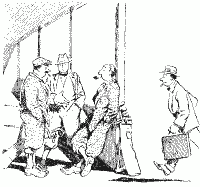 When a fellow gets his— |
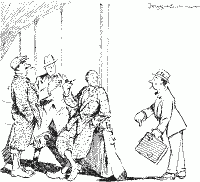 photo taken for the papers— |
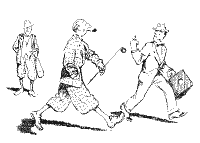 I think it's rotten bad form— |
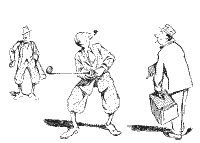 on the part of another fellow— |
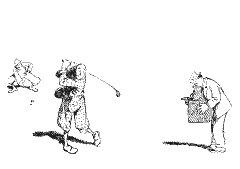 to spoil the picture by intruding a ball— |
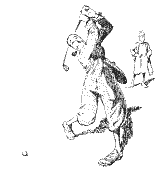 at the crucial moment. |
The men I most admire at the present time, though I take care not to tell them so to their faces, are the men who can do everything. By this I don't mean people of huge intellectual attainments, like Cabinet Ministers, or tremendous physical powers, like Tarzan of the Apes. It must be very nice to be able to have a heart-to-heart talk with Krassin or to write articles for the Sunday picture-papers, and very nice also to swing rapidly through the tree-tops, say, in Eaton Square; but none of these gifts is much help when the door-handle comes off. I hate that sort of thing to happen in a house.
In the Victorian age, of course, which was one of specialisation based upon peace and plenty, one simply sent for a door-handle replacer and he put it right. But nowadays the Door-handle Replacers' Union is probably affiliated to an amalgamation which is discussing sympathetic action with somebody who is striking, so nothing is done. This means that for weeks and weeks, whenever one tries to go out of the room, there is a loud crash like a 9.2 on the further side and a large blunt dagger clutched melodramatically in the right hand, and nobody to murder with it.
The man who can do everything is the kind of man who can mend a thing like a broken door-handle as soon as look at it. He always knows which of the funny things you push or pull on any kind of machine to make it go or stop, and what is wrong with the cistern and the drawing-room clock.
Such a man came into my house the other day. I call it my house, but it really seems to belong to a number of large people who walk in and out and shift packing-cases and splash paint and tramp heavily into the bathroom about 8.30 a.m. when I am trying to get off to sleep. They have also dug a large moat right through the lawn and the garden-path, which rather spoils the appearance of these places, though it is nice to be able to pull up the drawbridge at night and feel that one is safe from burglars. Anyhow, whether it is my house or theirs, the fact remains that the electric-bells were wrong. The man of whom I am speaking lives next-door, and he came in and pointed this out. "It is not much use having electric-bells," he said, "that don't ring."
I might have argued this point. I might have said that to press the button of a bell that does not ring gives one time to reflect on whether one really wants the thing one rang for, and thereafter on the whole vanity of human wishes, and so inculcates patience and self-discipline. It is quite possible that an Eastern yogi might spend many years of beneficial calm pressing the buttons of bells that do not ring. But I replied rather weakly, "No, I suppose not."
"I'll soon put that right for you," he said cheerily, and about five minutes later he asked me to press one of the buttons, and there was a loud tinkling noise. It seemed a pity that at the moment when the bell did happen to ring there should be nobody to come and answer it.
"Whatever did you do to them?" I asked.
"It only needed a little water," he said, and I had hard work to suppress my admiration. The very morning before, feeling that I ought to take a hand in all this practical work that was going on about the place, I had filled a large watering-can that I found lying about and wetted some things which someone had stuck into the garden. I have a kind of idea that they were carrots, but they may have been maiden-hair ferns. Somehow it had never occurred to me for a moment to go and water the electric bells.
Almost immediately afterwards this man discovered that all the knives in the kitchen were blunt and went and fetched some kind of private grindstone and sharpened them, and then told me that the apple-trees ought to be grease-banded, which I thought was a thing one only did to engines. And, when he had brought a hammer and some nails and put together a large bookcase which had collapsed as soon as The Outline of History was put on to it (I should like to know whether Canon Barnes can explain that), I was obliged to ask him to stop, in case the tramping men should see him and strike immediately for fear of the dilution of labour.
But what impressed me most was the part he took next day in the Railway Carriage Conference, which curiously enough was on the subject of strikes. There were several people in the carriage, and they were talking about what they had done during the railway strike last year, and what they would do if such a thing happened again. I said I should like to be a station-master if possible, because they had top-hats and grew such beautiful flowers. Only four or five trains seem to stop at our station during the day, and if there was a strike I suppose the number would be reduced to one or two. And I thought it would be rather nice to spend the day wearing a top-hat and watering the nasturtiums in the little rock-gardens behind the platform. Watering, I said, was quite easy when once one got into the swing of it.
But the man who could do everything seemed to know everything too, and he told me that station-masters were much too noble to strike. There were two kinds of station-masters, he said, both wearing top-hats, but one kind with full morning-dress underneath it and the other with uniform. But neither kind struck.
Slightly nettled at his superior knowledge, I asked him, "What did you do during the Great Strike?"
"Oh, I had rather fun," he said; "I controlled the signals at London Bridge."
If all the truth were known I expect that he is quite ready for Mr. Smillie's strike; that he has a handy little pick in his bedroom and knows of rather a jolly little coal-mine close by.
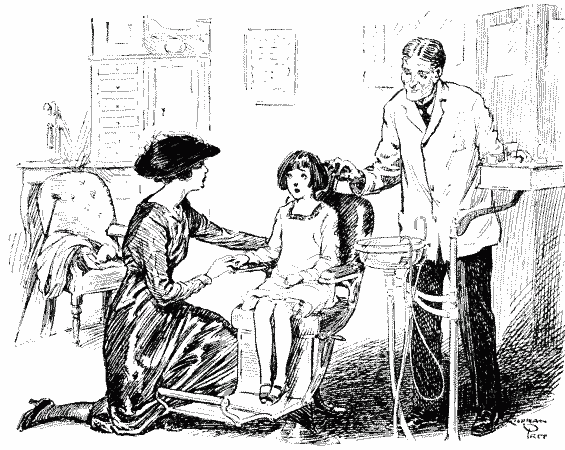
Mother (firmly, to little daughter about to have a tooth drawn). "Now, Betty, if you cry, I'll never take you to a dentist's again."
In the village of Picking's Pool
Lived Theobald, the village fool;
He had been simple from his birth
But kindly as the simple earth,
And in his heart he sang a song
Of "Ave, Mary" all day long.
On Good Friday the people came
To honour the rood of Christ His shame;
They scattered flowers and leaves and moss
About the foot of the humble cross
And, when they knelt and prayed and wailed,
Theobald saw the Mother, veiled
And bowed in a mother's agony.
"She suffers more than the Christ," said he.
Theobald searched the fields and lanes
To find a solace for Mary's pains;
All the flowers were plucked and gone
Save a little dull Parsley, sere and wan;
And Theobald wreathed it in simple guise;
"It mourns like her," said the Fool made wise.
When Holy Saturday morning broke
Back to the shrine went the village folk;
And lo! on the weeping Mother's brow
A chaplet of flowers was gleaming now;
And Theobald smiled secretly
To think he had soothed her agony.
And ever since Theobald crowned his Queen
Fool's Parsley has flowered amongst its green.
[A contemporary, having heard of the hat specially designed for M. Clemenceau, has decided that the bowler, the topper, the Homburg, the straw, the cloth cap and all other styles at present more or less in vogue leave much to be desired, and has therefore inaugurated a search for the ideal male headdress.]
The Smillie.—A Phrygian model, executed in red Russia leather. Special features are the asbestos lining, the steam vents and the water-jacket, which combine to minimise the natural heat of the head. Embellished with an heraldic cock's-comb gules, it is a striking conception.
The Premier.—A semi-Tyrolean type in resilient chamois, which can be readily converted to any desired shape, with or without extra stiffening. Its adaptability and the patent sound-proof ear-flaps make it particularly suitable for travellers. Detachable edelweiss and leek trimming.
The Eric.—An adaptation of the cap of maintenance in a special elastic material, warranted not to burst under pressure of abnormal expansion of the head of the wearer. Practically fool-proof.
The Winnie.—A fore-and-aft derived from a French model of the First Empire period, the severity of which is mitigated by the addition of little bells. A novelty is the mouthpiece in the crown, which enables the hat to be used as a megaphone at need. An elastic loop holds a fountain-pen in position. The whole to be worn on a head several sizes too big for it.
The Conan.—A straw bonnet of bee-hive shape. Medium weight. In a diversity of shades. The special puggaree of goblin blue material is designed to protect the wearer from moonstroke without obscuring the vision.
The Warner.—An easy-fitting crown carried out in harlequin flannel surmounts a full brim of restful willow-green. Garnished with intertwined laurel and St. John's-Wort, and decorated with the tail feather of a Surrey fowl, it makes a comfortable and distinguished headdress for a middle-aged gentleman.
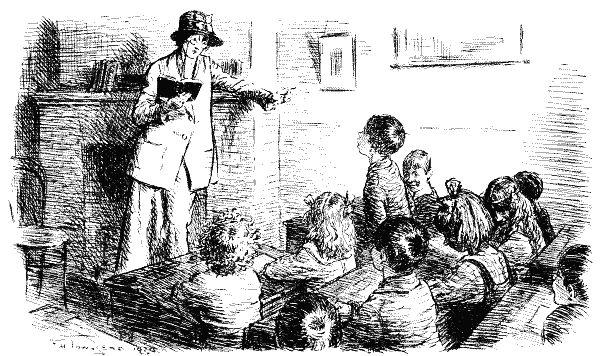
Teacher. "And Ruth walked behind the reapers, picking up the corn that they left. John, what do we call that?"
John (very virtuously). "Pinching."
In a sailormen's restaurant Rotherhithe way,
Where the din of the docksides is loud all the day,
And the breezes come bringing off basin and pond
And all the piled acres of lumber beyond
From the Oregon ranges the tang of the pine
And the breath of the Baltic as bracing as wine,
In a fly-spotted window I there did behold,
Among the stale odours of hot food and cold,
A ship in a bottle some sailor had made
In watches below, swinging South with the Trade,
When the fellows were patching old dungaree suits,
Or mending up oilskins and leaky seaboots,
Or whittling a model or painting a chest,
Or yarning and smoking and watching the rest.
In fancy I saw him all weathered and browned,
Deep crows'-feet and wrinkles his eyelids around;
A pipe in the teeth that seemed little the worse
For Liverpool pantiles and stringy salt-horse;
The hairy forearm with its gaudy tattoo
Of a bold-looking female in scarlet and blue;
The fingers all roughened and toughened and scarred,
With hauling and hoisting so calloused and hard,
So crooked and stiff you would wonder that still
They could handle with cunning and fashion with skill
The tiny full-rigger predestined to ride
To its cable of thread on its green-painted tide
In its wine-bottle world, while the old world went on
And the sailor who made it was long ago gone.
And still as he worked at the toy on his knee
He would spin his old yarns of the ships and the sea,
Thermopylæ, Lightning, Lothair and Red Jacket,
With many another such famous old packet,
And many a bucko and dare-devil skipper
In Liverpool blood-boat or Colonies' clipper;
The sail that they carried aboard the Black Ball,
Their skysails and stunsails and ringtail and all,
And storms that they weathered and races they won
And records they broke in the days that are done.
Or sometimes he'd sing you some droning old song,
Some old sailors' ditty both mournful and long,
With queer little curlycues, twiddles and quavers,
Of smugglers and privateers, pirates and slavers,
"The brave female smuggler," the "packet of fame
That sails from New York and the Dreadnought's her name,"
And "all on the coast of the High Barbaree,"
And "the flash girls of London was the downfall of he."
In fancy I listened, in fancy could hear
The thrum of the shrouds and the creak of the gear,
The patter of reef-points on topsails a-shiver,
The song of the jibs when they tauten and quiver,
The cry of the frigate-bird following after,
The bow-wave that broke with a gurgle like laughter.
And I looked on my youth with its pleasure and pain,
And the shipmate I loved was beside me again.
In a ship in a bottle a-sailing away
In the flying-fish weather through rainbows of spray,
Over oceans of wonder by headlands of gleam,
To the harbours of Youth on the wind of a dream.
C.F.S.
Jerusalem, August 27.—The High Commissioner visited yesterday afternoon the tomb of Abraham, Sarah, Rebecca, Isaac, Jacob and Leah in the Cave of Makpéla at Hebron."—Egyptian Mail.
No flowers, by request.
[pg 231]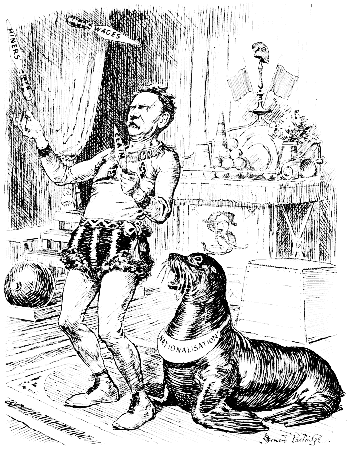
Mr. Smillie. "HERE, HOP IT, OR YOU'LL SPOIL THE WHOLE SHOW. YOU DON'T COME ON TILL MY NEXT TRICK."
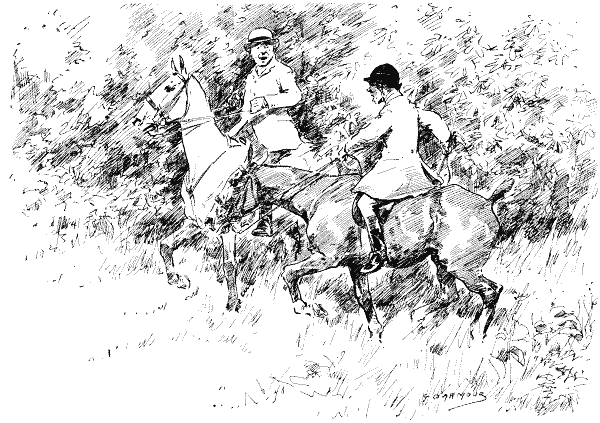
M.F.H. "Why the deuce aren't you with hounds? They're in the next parish by this."
New Whip (rib-roasting very bad cub-hunter). "'Tain't safe to go near 'em with this 'orse; they might think 'e was for eatin'."
Whither in these littered and overcrowded islands should one flee to escape the spectacle of outworn and discarded boots? I should go to a mountain-top and amongst mountain-tops I should choose the highest. I should scale the summit of Ben Nevis.
Yet it is but a few days since I saw on that proud eminence the unmistakable remains of an ordinary walking boot.
It reposed on the perilous edge of a snowdrift that even in summer curves giddily over the lip of the dreadful gulf over which the eastern precipice beetles. There is ever a certain pathos about discarded articles of apparel: a baby's outgrown shoe, a girl's forgotten glove, an abandoned bowler; but the situation of this boot, thus high uplifted towards the eternal stars, gave to it a mystery, a grandeur, a sublimity that held me long in contemplation.
How came it there?
The path that winds up that grey mountain is rough; its harsh stones and remorseless gradients take toll of leather as of flesh. Yet half a sole and a sound upper are better than no boot; and what climber but would postpone till after his descent the discarding of his damaged footgear?
Could it be, I asked myself, the relic and evidence of an inhuman crime? Was it possible that some party of climbers, arriving at the top lunchless and desperately hungry, had sacrificed their plumpest, disposing of his clothes over the cliff, but failing to hole out with this tell-tale boot?
But no, I bethought me of the price of leather. They would have reserved the boots, even at the risk of suspicion. Moreover, no one would ever reach that exacting altitude in a state of succulence.
A glow of sympathy, a thrill of appreciation swept through me as I realised what was at once the worthiest and the likeliest explanation.
Who shall plumb the depths of the affection of a true pedestrian for his boots, the companions and comfort of so many a pilgrimage? Who but the climber, the hill-tramp, knows the pang of regret with which he faces at last the truth that his favourite boots are past repair, the sorrow and self-reproach with which he permits them to be consigned to Erebus?
I saw it all. As the Roman veteran hung upon the temple wall of Mars the arms he might no longer wield, so hither came some lofty-minded climber, bearing in devoted hands his outworn and faithful boot, to leave it sadly and with reverence in this most worthy resting-place, here to repose at the end of all the roads it had trod, on the highest of all the native hills it had climbed.
"Mr. Roberts, Member of Parliament, has arrived. Mr. Roberts is a tall and well-built gentleman with a posing appearance."
"Families supplied in 18, 12 or 6 gallon casks."—Hertford brewer's notice.
Where's your Diogenes now?
"The dinner was in the House of Commons, and I sat next to Henry. I was tremendously impressed by his conversation and his clean Cromwellian face."
From a famous autobiography.
It was, we trust, the Cromwell touch rather than the cleanness that was so impressive.
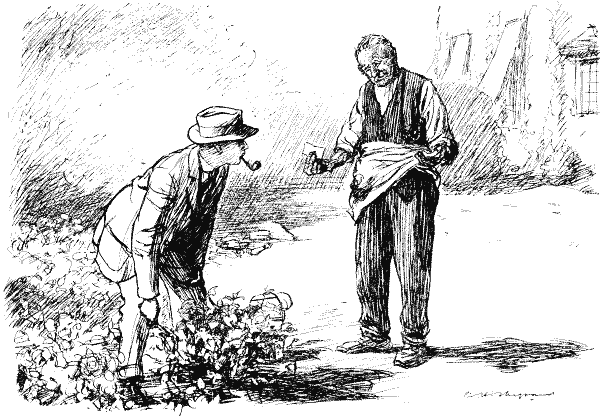
Ancient Gardener (who has just been paid). "Oi say, Maister, there's summat wrong wi' ma brass."
Employer. "What's that, John?"
A.G. "Wha, sithee, tha's gi'en ma one ta mony."
Employer. "You're very honest, John."
A.G. "Weel, tha sees I thoat it mid 'a' bin a trap."
How odd it is that our Papas
Keep taking us to cinemas,
But still expect the same old scares,
The tiger-cats, the woolly bears,
The lions on the nursery stairs
To frighten as of old!
Considering everybody knows
A girl can throttle one of those
While choking with the other hand
The captain of a robber band,
They leave one pretty cold.
The lion has no status now;
One has one's terrors, I'll allow,
The centipede, perhaps the cow,
But nothing in the Zoo;
The things that wriggle, jump or crawl,
The things that climb about the wall,
And I know what is worst of all—
It is the earwig—ugh!
The earwig's face is far from kind;
He must have got a spiteful mind;
The pincers which he wears behind
Are poisonous, of course;
And Nanny knew a dreadful one
Which bit a gentleman for fun
And terrified a horse.
He is extremely swift and slim,
And if you try to tread on him
He scuttles up the path;
He goes and burrows in your sponge
And takes one wild terrific plunge
When you are in the bath;
Or else—and this is simply foul—
He gets into a nice hot towel
And waits till you are dried,
And then, when Nanny does your ears,
He wrrriggles in and disappears:
He stays in there for years and years
And crrrawls about inside.
At last, if you are still alive,
A lot of baby ones arrive;
But probably you've died.
How inconvenient it must be!
There isn't any way, you see,
To get him out again;
So, when you want to frighten me
Or really give me pain,
Please don't go on about that bear
And all those burglars on the stair;
I shouldn't turn a tiny hair
At such Victorian stuff;
You only have to say instead,
"There is an Earwig in Your Bed"
And that will be enough.
A.P.H.
On glancing the other day through the only human column of my newspaper—that headed "Personal"—I was much intrigued by the advertisement of a gentleman who styled himself a "busy commercial magnate," and who announced his urgent need of a "right-hand man." The duties of the post were not particularised, but their importance was made clear by the statement that "any salary within reason" would be paid to a really suitable person.
No, I did not think of applying for the post myself; a twelve months' adjutancy to a dyspeptic Colonel had long cured me of the desire to bottle-wash for anyone again, however lavish the remuneration. But, I thought to myself, it must evidently be a profitable notion to employ a right-hand man, or why should this magnate person be so airy on the subject of salary? Would it not then pay me to engage somebody in a similar capacity? Increased production, in spite of Trade Union economics, is emphatically a need of the moment. With a right-hand man at my right hand (when he wasn't at my left) I could, I felt sure, increase [pg 234] my own output enormously; and I began to plan out my daily work under the reconstruction scheme.
I will call him "Snaggs"; that will save me the trouble of having to write "my right-hand man" every time I want to refer to him; but when he enters my service such economy of labour will not, of course, be necessary. Snaggs, then, will arrive punctually at nine every morning—no, on second thoughts he will sleep in, in case an inspiration that needs recording arrives after I have gone to bed. (I shrink from estimating how much wealth I have lost through going to sleep on my nocturnal inspirations, which the most thorough search next morning never avails to recapture; but a speaking-tube, with alarm attachment, running into Snaggs's room will alter all that.)
His first duty of the day will be to wade through all the newspapers and cut out any paragraphs that may serve as pegs for an article or a set of verses. My own difficulty in this respect has always been that I can never manage to get through more than one paper in a working morning, and not all of that; invariably my attention gets caught by some long and instructive but (for my purposes) hopelessly unsuggestive dissertation on Pedigree Pigs or The Co-operative Movement in Lower Papua, and I consequently overlook many of those inspiring little "stories" that inform us, for example, that a distinguished physician advocates the use of tomato-sauce as a hair-restorer.
By the time I have finished breakfast, I reckon, Snaggs will have found me subjects for at least a dozen effusions, neatly arranged with a few skeleton suggestions for the treatment of each. I shall first decide which are to be handled in prose and which in verse, and in the case of the latter shall jot down a few words and phrases that will obviously have to be dragged in as line-endings. Then I shall put Snaggs on to the purely mechanical drudgery of finding all the possible rhymes to these words (e.g., fascinate, assassinate, pro-Krassinate—you know the sort of thing that's called for), and by the time he has catalogued them all I shall have dashed off most of the prose articles, which Snaggs will then proceed to type while I am engaged in the comparatively simple task of piecing together the verse jigsaws. In this way I should easily be able to earn an ordinary week's takings in a morning.
The next task will be the placing of this material, and that is how Snaggs's afternoons will be spent. I have always had an unnecessarily tender feeling for editors, and often, after laboriously giving birth to an article, have concealed it in a drawer rather than run the risk of boring anyone with its perusal. Snaggs, however, will be fashioned of more pachydermatous material and will daily make himself such a nuisance that they'll give him an order, and possibly a long contract, to get rid of him. By a proper system of book-keeping he will also save me from the occasional blunder of sending the same article to the same paper twice.
My wife, to whom I have submitted this brain-wave, says that the first job to employ Snaggs on will be calling on the Bank Manager to arrange about the overdraft which neither of us has so far had the courage to moot. But that, I am afraid, would inspire him with foolish doubts as to the stability of his princely salary. Perhaps it will be best if, before actually engaging Snaggs, I convert myself into a limited company, "for the purpose of acquiring and enlarging the business and goodwill of the private enterprise known as Percival Trumpington-Jones, Esq." A sufficient number of shares will be issued to guarantee Snaggs at least his first year's screw; that done, the proposition should be practically gilt-edged. So who's coming in on the bargain-basement floor?
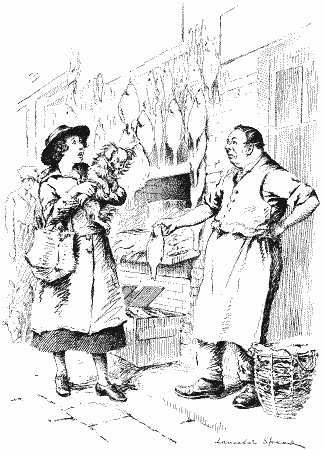
Customer. "Why, you've put your prices up again!"
Fishmonger. "Well, Mum, I ask yer, 'ow else are we to fight the profiteer at 'is own game?"
I imagine that the authors who founded this play on a Hungarian original regarded it as an ambitious piece of work. If so, they were right in the sense that they have attempted something very much beyond their powers. In the view of the gentleman who addressed us at the fall of the curtain (I understand that he was one of the authors) it offered magnificent opportunities (I think "magnificent" was the word) for the brilliant gifts of two of the actors. Certainly it covered a good bit of ground, what with this world and the next; for it started with roundabouts on the Heath, and got as far away as the Judgment Day (Hungarian style?)—and fourteen years after.
I may have a contemptibly weak stomach for this kind of thing, but I confess that I don't care much for a representation of the Judgment Day in a melodrama of low life. Of course low life has just as much right as any other sort of life to be represented in a Judgment Day scene; but it ought to behave itself there and not introduce back-chat.
I should explain that it was a special Suicide Court, and that the object of The Magister, as the Presiding Judge was named in the programme, was to inquire into the record of the delinquent and, if his answers were satisfactory, to allow him to revisit the scenes of his earthly life in order to repair any little omissions that he might have made in the hurry of departure. Unfortunately the leading case was a bad example of suicide. It had not been deliberate; he had simply killed himself impromptu in a tight corner to avoid arrest for intended murder.
Worse still, when he returned to earth after a lapse of fourteen years' purgatory (between the sixth and seventh scenes), for his record was a rotten one and he had shown no signs of penitence, the revenant made very poor use of his hour. Returning to his wife whom he had brutalised, he found that she had taught their girl-child to regard him as a paragon of virtue, and most of his limited time was spent in correcting this beautiful legend. You see, at the time of his death he had had no chance of making the child realise how bad he was, for the excellent reason that she had not yet been born, so he seized this opportunity of making good that omission.
As a practical illustration of the kind of man he really had been, he struck the child violently on the arm. We all saw him do it and we all heard the smack, but the child assured us that she had not felt anything. This I suppose was the author's way, ingenuous enough, of reminding us that it was a case of spirit and not of flesh, whatever our eyes and ears might persuade us to think of it.
Already in a previous scene there had been the same old difficulty. While the man lay dead on his bed his spirit had been summoned by a Higher Power (indicated in a peep-show), and his corpse sat up, displacing the prostrate form of the widow, who had to take up a new position, without however appearing to notice anything. It was still sitting up when the curtain fell, and incidentally was caught in the act of resuming its recumbent position when the curtain rose again for the purpose of allowing the actors to receive our respectful plaudits.
Behind me I heard an American lady suggest that if they could somehow distinguish the spirit from the body it would be better for our illusions. To which her neighbour expressed the opinion that they would eventually manage to do that feat. I await, less hopefully, this development in stage mechanism. Meanwhile Mary Rose has much to answer for.
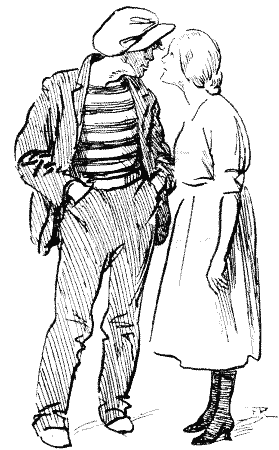
"The Daisy" (Mr. Caine). "What made you take a fancy to me?"
Julia (Miss Merrall). "I dunno."
(Sympathetic appreciation of her ignorance on part of audience.)
The play began promisingly enough with a scene full of colour and humanity, of humour and pathos. We were among the roundabouts, whose florid and buxom manageress, Mrs. Muscat (admirably played by Miss Suzanne Sheldon), was having a quarrel of jealousy with her assistant and late lover, "The Daisy," who had been seen taking notice of Another. The dumb devotion of this child, Julia (Miss Mary Merrall), who could never find words for her love—she said little beyond "Yuss" and "I dunno"—was a very moving thing; and the patient stillness with which she bore his subsequent brutality held us always under a strange fascination.
For the rest it was an ugly and sordid business, relieved only by the coy confidences of the amorous Maria (played by Miss Gladys Gordon with a nice sense of fun). Mr. Henry Caine, as "The Daisy," presented very effectively the rough-and-ready humour and the frank brutality of his type; but he perhaps failed to convey the devastating attractions which he was alleged to have for the frail sex; and his sudden spasms of tragic emotion seemed a little out of the picture.
Apart from the painful crudity of the scene that was loosely described as "The Other Side," the play abounded in amateurisms. For one thing there was too much sermonising. It began with an obtrusive homily on the part of an inspector of police, who went out of his way to admonish Julia about the danger of associating with "The Daisy." Another instance was that of the bank-messenger, a person of such self-possession and detachment that he contrived to deliver a moral address while holding one foiled villain at the point of his revolver and gripping the other's wrist as in a vice.
Nothing again could have been more naïve than the innocent home-coming of the domestic carving-knive, freshly sharpened, from the grinder's just in time to be diverted to the objects of a murderous enterprise.
Altogether, it was rather poor stuff, unworthy of the talent of many of its interpreters and of the trouble that Miss Edith Craig had spent over its scenic effects. Perhaps the audience had been led to expect too much, for "The Daisy," far from being the "wee, modest" flower of Robert Burns, had been at some pains to draw preliminary attention to its merits.
"That a woman ought to dress quietly and practically in the street is unquestionable."
"As the harvest season this year is late, sport will not be general for at least two weeks hence, when grain crops may be expected to be in stook. For some time to come sheep will be confined to the low hill-sides and pasture lands and turnip fields, and a few good bags were had there yesterday."—Scotch Paper.
We still prefer the old-fashioned sport of partridge-shooting.
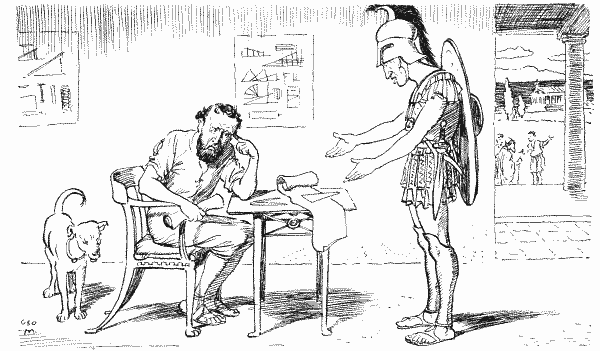
Greek Officer. "Can't you think of something quick? The army is waiting and the enemy approaches."
Archimedes. "Science is not to be hustled, General. Just get your army to do a little plain fighting while I think out a fancy scheme."
The bells of Cadiz clashed for them
When they sailed away;
The Citadel guns, saluting, crashed for them
Over the Bay;
With banners of saints aloft unfolding,
Their poops a glitter of golden moulding,
Tambours throbbing and trumpets neighing,
Into the sunset they went swaying.
But the port they sought they wandered wide of,
And they won't see Spain again this side of
Judgment Day.
For they're down, deep down, in Dead Man's Town,
Twenty fathoms under the clean green waters.
No more hauling sheets in the rolling treasure fleets,
No more stinking rations and dread red slaughters;
No galley oars shall bow them nor shrill whips cow them,
Frost shall not shrivel them nor the hot sun smite,
No more watch to keep, nothing now but sleep—
Sleep and take it easy in the long twilight.
The bells of Cadiz tolled for them
Mournful and glum;
Up in the Citadel requiems rolled for them
On the black drum;
Priests had many a mass to handle,
Nuestra Señora many a candle,
And many a lass grew old in praying
For a sight of those topsails homeward swaying—
But it's late to wait till a girl is bride of
A Jack who won't be back this side of
Kingdom Come.
But little they care down there, down there,
Hid from time and tempest by the jade-green waters;
They have loves a-plenty down at fathom twenty,
Pearly-skinned silver-finned mer-kings' daughters.
At the gilt quarter-ports sit the Dons at their sports,
A-dicing and drinking the red wine and white,
While the crews forget their wrongs in the sea-maids' songs
And dance upon the foc'sles in the grey ghost light.
Patlander.
"REMARKABLE OVAL SCORING."
We have made some remarkable scores of that shape ourselves in the past, but we never boast about them.
"He believed that the English pronounced in the streets of London in, say, 200 years' time, will be much different, if not unintelligible, to the man of to-day."—Daily Paper.
Just like the English in some of our newspapers.
"The Secretary of State for India is not persona grata either to the British House of Commons or to the British public. That is the old-fashioned English of it."—Bangalore Daily Post.
It would be interesting to see the old-fashioned Latin of it.
"Will any Lady Recommend Country Home of the best where 2 precious Poms can be happy and would be looked after for 6 weeks? Surrey preferred."—Morning Paper.
Think of their disgust at finding themselves boarded out in Sussex or Kent.
"Young Hungarian Lady with English and German knolidgement wants sob with English or American Organization."—Pester Lloyd.
Laugh and the world laughs with you;
Sob and you sob alone.
"A penny for your thoughts," I said to Kathleen.
"I like that," said Kathleen indignantly. "A penny was the market value of my thoughts in 1914. Why should butter and cheese and reels of cotton go up more than double and my thoughts stay the same?"
"Twopence," I offered.
"I said more than double," she remarked coldly.
I plunged. "Sixpence," I said.
"Done!"
"I'll put it in the collection bag for you next Sunday," I added hastily.
"Well, I was thinking of Veronica's future. I was wondering what she was going to be."
"When we went to the Crystal Palace," I said gently, "I rather gathered that she wanted to be the proprietor of a merry-go-round. They were dragons with red-plush seats."
"She might go into Parliament," said Kathleen dreamily; "I expect women will be able to do everything by the time she's grown up. She might be a Cabinet Minister. I don't see why she shouldn't be Prime Minister."
"Her hair's just about the right length now," I said. "And perhaps she could give me congenial employment. I wouldn't mind being Minister of Transport. There's quite a good salary attached. But of course she may have ideas of her own on the subject."
Feeling curious, I went in search of Veronica. I found her at a private dance given by the butterflies and hollyhocks at the other end of the lawn. When she saw me she came to meet me and made her excuses very politely.
"We've just been wondering what you're going to be when you've stopped being a little girl," I said.
"Me?" said Veronica calmly. "Oh, I'm going to be a fairy. You don't want me to be anything else, do you?" she added anxiously.
Even the Prime Minister's post seemed suddenly quite flat.
"Oh, no," I said. "I think you've made a very good choice." But she was not quite satisfied.
"I shall hate going away from you," she said. "Couldn't you come too?"
"Where?"
"To Fairyland."
"Ah!" I said, "that takes some thinking about. Could we come back if we didn't like it?"
"N-no, I don't fink so. I've never heard of anyone doing that. But you'll love it," she went on earnestly. "You'll be ever so tiny and you can draw funny frost pictures wiv rainbows and fold up flowers into buds and splash dew-water over everyfing at night and ride on butterflies and help the birds to make nests. Fink what fun to help a bird to make a nest! You'll love it!"
"Is that all?" I said sternly. "Are you keeping nothing from me? What about witches and spells and being turned into frogs? I'm sure I remember that in my fairy tales."
"Oh, nothing that matters," she said quickly. "You can always tell a witch, you know, and we'll keep out of their way. An' if a nasty fairy turns you into a frog a nice one will always turn you back quite soon. It's all right. You mustn't worry about that. There won't be any fun if you don't come too, darlin'," she ended shamelessly.
I considered.
"Veronica," I said at last, "is there such a thing as Ireland in Fairyland? Is there an exchange that won't keep steady? Is there any labour trouble?"
She shook her head.
"I've never heard of anyfing that sounded like those," she said; "I'm sure there isn't."
"That decides it," I said. "We'll all come. As soon as you can possibly arrange it."
She heaved a sigh of relief and ran off to tell the glad news to the butterflies and hollyhocks.
So that's settled.
I think we've made a wise decision.
After all, what's a witch or two, or even a temporary existence as a frog, compared with a coal strike?
When that I was a tiny grub,
And peevish and inclined to blub,
Mother, my Queen,
My infant grief you would assuage
With promise of the ripe greengage
And purple sheen
Of luscious plums,
"When Autumn comes."
The Autumn days are flying fast;
Across the bleak skies overcast
Scurries the wind;
Where are those plums of purple hue,
Mother? I only wish that you
Had disciplined
My pampered youth
To face the truth.
The time for wasps is nearly done,
And what is life without the sun,
Mother, my Queen?
Dull stupor numbs your royal head;
Torpid my sisters lie—or dead;
Come, let me lean
Back on my sting
And end the thing.
(For the benefit of the Examiners in the Oxford School of English Literature.)
(1) Compare, in respect of pulpit oratory, (a) Dr. South with "Woodbine Willie," and (b) Dr. Michael Furse (Bishop of St. Albans) with the Judicious Hooker.
(2) Give reasons in support of Mr. Beverley Nicholls' emendation of the lines in The Ancient Mariner—
The wedding guest he beat his breast,
For he heard the proud Sassoon.
(3) Re-write "Tears, idle tears" in the style of (a) Dr. Johnson, (b) Calisthenes, (c) the Sitwells.
(4) What do you know of Casanova, Karsavina, Cagliostro, Kennedy Jones, Captain Peter Wright, Epstein, Eckstein and Einstein? When did Sir Oliver Lodge say that he would not leave ein Stein unturned until he had upset the theory of Relativity?
(5) Give a complete list of all the poets, major and minor, at present residing on Boar's Hill, and trace their influence on the Baconian controversy.
(6) Distinguish by psycho-analysis between (a) Sydney Smith and Sidney Lee, (b) George Meredith and George Robey, noting convergences as well as divergences of mentality, physique and sub-conscious uplift.
(7) Would Jason, who sailed in the Argo, have laid an embargo on Margot as passenger or supercargo? Estimate the probable results of her introduction to Medea, and its effect on the views and translations of Professor Gilbert Murray.
(8) What eminent Georgian critic said that Tennyson's greatest work was his Idols of the Queen?
(9) Estimate the effect on Reconstruction if Mr. Bottomley were to devote himself exclusively to theological studies, and Mr. Wells were to take up his abode permanently in Russia.
From a Pimlico shop window:—
Apparently not worth a "d."
"Professor ——, the pianist, who is trying to complete 110 hours' continuous playing, completed fifty-five hours on the first day."
That makes it too easy.
"Mme. Karsavina is taller than Pavlova, but has an equally perfect figure. The Greeks would have bracketted her with Venus and Aphrodite."—Provincial Paper.
The two last have, of course, been constantly bracketed.
Not for a long time have I got so great a pleasure from any collection of short sketches as now from Miss Anne Douglas Sedgwick's Autumn Crocuses (Secker). Not only has the whole book a pleasant title, but each of these stories is happily called after some flower that plays a part in its development. I am aware of the primly Victorian sound of such a description applied to art so modern as that of Miss Sedgwick. You know already (I hope) how wonderfully delicate is her almost passionate sensibility to the finer shades of a situation. It is, I suppose, this quality in her writing that makes me still have reminiscent shivers when I think about that horrible little bogie-tale, The Third Window; and these "Flower Pieces" (as 1860 might have called them) are no whit less subtle. I wish I had space to give you the plots of some of them; "Daffodils," for instance, a quite unexpected and thrilling treatment of perhaps the oldest situation of literature; or "Staking a Larkspur," the only instance in which Miss Sedgwick's gently smiling humour crystallizes definitely into comedy; or "Carnations," the most brilliantly written of all. As this liberty is denied me you must accept a plain record of very rare enjoyment and take steps to share it.
Chief among the Secrets of Crewe House (Hodder and Stoughton), now divulged to the mere public, are the marvellous efficiency and superhuman success achieved by the British Enemy Propaganda Committee, which operated in Lord Crewe's London house under the directorate of Lord Northcliffe. "What is propaganda?" the author asks himself on an early page, and the right answer could have been made in four letters: Advt. It is endorsed by the eulogistic manner in which the Committee's work is written up by one of them, Sir Campbell Stuart, K.B.E., and illustrated by photographs of Lord Northcliffe (looking positively Napoleonic) and of the sub-supermen. As in all great achievements, the main principle was a simple one. A good article is best advertised by truth; and it was the truth, the whole truth and nothing but the truth which the Committee, with admirable conciseness and no little ingenuity, so promulgated that it could no longer escape notice even in the Central Empires. Not the least of the Committee's difficulties and achievements was to get the truth of our cause and policy so defined as to be susceptible of unequivocal statement by poster, leaflet, film and gramophone record. Sir Campbell Stuart perhaps tends to underrate the rival show, the German propaganda organization, whose work, if it did Germany little good, has done and is still doing colossal harm to us. Also he tends to forget that Lord Haig and his little lot in France at any rate helped the Committee to effect the breakdown of the German moral in 1918 and so to win the war.
I feel that Miss Margaret Symonds had a purpose in writing A Child of the Alps (Fisher Unwin), but, unless it was to show how mistaken it is, as Basil, the Swiss farmer, puts it, "to think when thou shouldst have been living," it has evaded me. The book begins with a romantic [pg 239] marriage between an Englishwoman of some breeding and a Swiss peasant who is a doctor, and tells the history of their daughter until she is about to marry Basil, her original sweetheart. I cannot be more definite or tell you how her first marriage—with an English cousin—turned out, because Linda's own account of this is all we get, and that is somewhat vague. A great many descriptions of beautiful scenery, Swiss and Italian, come into the book, and a great many people, some of them very individual and lifelike; but the author's concentration on Linda gives them, people and scenery alike, an unreal and irritating effect of having been called into being solely to influence her heroine, and that lessens their fascination. Yet it is a book which makes a distinct impression, and once read will not easily be forgotten. It seems a strange comment to make on a new volume of a "First Novel Library," but A Child of the Alps, as you will realise if you have been reading novels long enough, is almost exactly the sort of book its title would have suggested had it appeared thirty years ago.
These wrapper-artists should really exercise a little more discretion. To depict on the outside of a book the facsimile of a cheque for ten thousand pounds might well be to excite in some readers a mood of wistfulness only too apt to interfere with their appreciation of the contents. Fortunately, Uncle Simon (Hutchinson) is a story quite cheery enough even to banish reflections on the Profiteer. A middle-aged and ultra-respectable London solicitor, whose thwarted youth periodically awakes in him and insists upon his indulging all those follies that should have been safely finished forty-odd years before—here, you will admit, is a figure simply bursting with every kind of possibility. Fortunately, moreover, Margaret and H. de Vere Stacpoole have shown themselves not only fully alive to all the humorous chances of their theme, but inspired with an infectious delight in them. It is, for example, a singularly happy touch that the wild oats that Uncle Simon tries to retrieve are not of today but from the long-vanished pastures of mid-Victorian London. Of course such a fantasy can't properly be ended. Having extracted (as I gratefully admit) the last ounce of entertainment from him, the authors simply wake Uncle Simon up and go home. As a small literary coincidence I may perhaps add that it was my fortune to read the book in the very garden (of that admirable Shaftesbury inn) which, under a transparent disguise, is the scene of Uncle Simon's restoration. Naturally this enhanced my enjoyment of a sportive little comedy, which I can most cordially commend.
Mr. St. John G. Ervine is a versatile author who exhibits that unevenness of quality which is generally the besetting sin of versatile authors. When he is good he is very good indeed, and in The Foolish Lovers (Collins) he is at his best. The Ulsterman is seldom either a lovable or an interesting character. He has certain rude virtues which command respect and other qualities, not in themselves virtues—such as clan conceit and an intensely narrow provincialism—that beget the virtues of industry, honesty and frugality. But to the philosopher and student of character all types are interesting, and Mr. Ervine's skill lies in his ability not merely to draw his Ballyards hero to the life but to interest us in his unsuccessful efforts to become a successful writer. It is merely clan conceit that drives him forward in the pursuit of this purpose, for circumstances have clearly intended him to carry on the grocery business in which the family have achieved some success and a full measure of local esteem. The MacDermotts never failed to accomplish their purpose; he, as a MacDermott, proposed to achieve fame as a novelist. It was quite simple. But it turned out to be not at all simple. The quite provincial young MacDermott cannot make London accept him at his own valuation and his novels are poor stuff. His wife, loyal to him but still more loyal to the MacDermott clan into which she has married and which now includes a little MacDermott, is the first to recognise that her husband had best seek romance in the family grocery business. Then the MacDermott himself, with that shrewdness which may be late in coming to an Ulsterman but never fails him altogether, realises it too and the story is finished.
The main object of the characters in The Courts of Idleness (Ward, Lock) was to amuse themselves, and as their sprightly conversations were often punctuated by laughter I take it that they succeeded. To give Mr. Dornford Yates his due he is expert in light banter; but some three hundred pages of such entertainment tend to create a sense of surfeit. The first part of the book is called, "How some passed out of the Courts for ever," and then comes an interlude, in which we are given at least one stirring war-incident. I imagine that Mr. Yates desires to show that, although certain people could frivol with the worst, they could also fight and die bravely. The second part, "How others left the Courts only to return," introduces a new set of people but with similar conversational attainments. Mr. Yates can be strongly recommended to anyone who thinks that the British take themselves too seriously.
"The Germans have singed the Protocol."—China Advertiser.
"At 11.30 last night a black iron safe, 22 inches by 18, was found by the roadside at Leaves Green-road, Keston. When examined it was found that the bottom of the safe had been cut out. A burglary is suspected."—Evening Paper.
End of the Project Gutenberg EBook of Punch, or the London Charivari, Vol.
159, September 22, 1920, by Various
*** END OF THIS PROJECT GUTENBERG EBOOK PUNCH, OR THE LONDON ***
***** This file should be named 17653-h.htm or 17653-h.zip *****
This and all associated files of various formats will be found in:
http://www.gutenberg.org/1/7/6/5/17653/
Produced by Jonathan Ingram, Lesley Halamek and the Online
Distributed Proofreading Team at http://www.pgdp.net
Updated editions will replace the previous one--the old editions
will be renamed.
Creating the works from public domain print editions means that no
one owns a United States copyright in these works, so the Foundation
(and you!) can copy and distribute it in the United States without
permission and without paying copyright royalties. Special rules,
set forth in the General Terms of Use part of this license, apply to
copying and distributing Project Gutenberg-tm electronic works to
protect the PROJECT GUTENBERG-tm concept and trademark. Project
Gutenberg is a registered trademark, and may not be used if you
charge for the eBooks, unless you receive specific permission. If you
do not charge anything for copies of this eBook, complying with the
rules is very easy. You may use this eBook for nearly any purpose
such as creation of derivative works, reports, performances and
research. They may be modified and printed and given away--you may do
practically ANYTHING with public domain eBooks. Redistribution is
subject to the trademark license, especially commercial
redistribution.
*** START: FULL LICENSE ***
THE FULL PROJECT GUTENBERG LICENSE
PLEASE READ THIS BEFORE YOU DISTRIBUTE OR USE THIS WORK
To protect the Project Gutenberg-tm mission of promoting the free
distribution of electronic works, by using or distributing this work
(or any other work associated in any way with the phrase "Project
Gutenberg"), you agree to comply with all the terms of the Full Project
Gutenberg-tm License (available with this file or online at
http://gutenberg.org/license).
Section 1. General Terms of Use and Redistributing Project Gutenberg-tm
electronic works
1.A. By reading or using any part of this Project Gutenberg-tm
electronic work, you indicate that you have read, understand, agree to
and accept all the terms of this license and intellectual property
(trademark/copyright) agreement. If you do not agree to abide by all
the terms of this agreement, you must cease using and return or destroy
all copies of Project Gutenberg-tm electronic works in your possession.
If you paid a fee for obtaining a copy of or access to a Project
Gutenberg-tm electronic work and you do not agree to be bound by the
terms of this agreement, you may obtain a refund from the person or
entity to whom you paid the fee as set forth in paragraph 1.E.8.
1.B. "Project Gutenberg" is a registered trademark. It may only be
used on or associated in any way with an electronic work by people who
agree to be bound by the terms of this agreement. There are a few
things that you can do with most Project Gutenberg-tm electronic works
even without complying with the full terms of this agreement. See
paragraph 1.C below. There are a lot of things you can do with Project
Gutenberg-tm electronic works if you follow the terms of this agreement
and help preserve free future access to Project Gutenberg-tm electronic
works. See paragraph 1.E below.
1.C. The Project Gutenberg Literary Archive Foundation ("the Foundation"
or PGLAF), owns a compilation copyright in the collection of Project
Gutenberg-tm electronic works. Nearly all the individual works in the
collection are in the public domain in the United States. If an
individual work is in the public domain in the United States and you are
located in the United States, we do not claim a right to prevent you from
copying, distributing, performing, displaying or creating derivative
works based on the work as long as all references to Project Gutenberg
are removed. Of course, we hope that you will support the Project
Gutenberg-tm mission of promoting free access to electronic works by
freely sharing Project Gutenberg-tm works in compliance with the terms of
this agreement for keeping the Project Gutenberg-tm name associated with
the work. You can easily comply with the terms of this agreement by
keeping this work in the same format with its attached full Project
Gutenberg-tm License when you share it without charge with others.
1.D. The copyright laws of the place where you are located also govern
what you can do with this work. Copyright laws in most countries are in
a constant state of change. If you are outside the United States, check
the laws of your country in addition to the terms of this agreement
before downloading, copying, displaying, performing, distributing or
creating derivative works based on this work or any other Project
Gutenberg-tm work. The Foundation makes no representations concerning
the copyright status of any work in any country outside the United
States.
1.E. Unless you have removed all references to Project Gutenberg:
1.E.1. The following sentence, with active links to, or other immediate
access to, the full Project Gutenberg-tm License must appear prominently
whenever any copy of a Project Gutenberg-tm work (any work on which the
phrase "Project Gutenberg" appears, or with which the phrase "Project
Gutenberg" is associated) is accessed, displayed, performed, viewed,
copied or distributed:
This eBook is for the use of anyone anywhere at no cost and with
almost no restrictions whatsoever. You may copy it, give it away or
re-use it under the terms of the Project Gutenberg License included
with this eBook or online at www.gutenberg.org
1.E.2. If an individual Project Gutenberg-tm electronic work is derived
from the public domain (does not contain a notice indicating that it is
posted with permission of the copyright holder), the work can be copied
and distributed to anyone in the United States without paying any fees
or charges. If you are redistributing or providing access to a work
with the phrase "Project Gutenberg" associated with or appearing on the
work, you must comply either with the requirements of paragraphs 1.E.1
through 1.E.7 or obtain permission for the use of the work and the
Project Gutenberg-tm trademark as set forth in paragraphs 1.E.8 or
1.E.9.
1.E.3. If an individual Project Gutenberg-tm electronic work is posted
with the permission of the copyright holder, your use and distribution
must comply with both paragraphs 1.E.1 through 1.E.7 and any additional
terms imposed by the copyright holder. Additional terms will be linked
to the Project Gutenberg-tm License for all works posted with the
permission of the copyright holder found at the beginning of this work.
1.E.4. Do not unlink or detach or remove the full Project Gutenberg-tm
License terms from this work, or any files containing a part of this
work or any other work associated with Project Gutenberg-tm.
1.E.5. Do not copy, display, perform, distribute or redistribute this
electronic work, or any part of this electronic work, without
prominently displaying the sentence set forth in paragraph 1.E.1 with
active links or immediate access to the full terms of the Project
Gutenberg-tm License.
1.E.6. You may convert to and distribute this work in any binary,
compressed, marked up, nonproprietary or proprietary form, including any
word processing or hypertext form. However, if you provide access to or
distribute copies of a Project Gutenberg-tm work in a format other than
"Plain Vanilla ASCII" or other format used in the official version
posted on the official Project Gutenberg-tm web site (www.gutenberg.org),
you must, at no additional cost, fee or expense to the user, provide a
copy, a means of exporting a copy, or a means of obtaining a copy upon
request, of the work in its original "Plain Vanilla ASCII" or other
form. Any alternate format must include the full Project Gutenberg-tm
License as specified in paragraph 1.E.1.
1.E.7. Do not charge a fee for access to, viewing, displaying,
performing, copying or distributing any Project Gutenberg-tm works
unless you comply with paragraph 1.E.8 or 1.E.9.
1.E.8. You may charge a reasonable fee for copies of or providing
access to or distributing Project Gutenberg-tm electronic works provided
that
- You pay a royalty fee of 20% of the gross profits you derive from
the use of Project Gutenberg-tm works calculated using the method
you already use to calculate your applicable taxes. The fee is
owed to the owner of the Project Gutenberg-tm trademark, but he
has agreed to donate royalties under this paragraph to the
Project Gutenberg Literary Archive Foundation. Royalty payments
must be paid within 60 days following each date on which you
prepare (or are legally required to prepare) your periodic tax
returns. Royalty payments should be clearly marked as such and
sent to the Project Gutenberg Literary Archive Foundation at the
address specified in Section 4, "Information about donations to
the Project Gutenberg Literary Archive Foundation."
- You provide a full refund of any money paid by a user who notifies
you in writing (or by e-mail) within 30 days of receipt that s/he
does not agree to the terms of the full Project Gutenberg-tm
License. You must require such a user to return or
destroy all copies of the works possessed in a physical medium
and discontinue all use of and all access to other copies of
Project Gutenberg-tm works.
- You provide, in accordance with paragraph 1.F.3, a full refund of any
money paid for a work or a replacement copy, if a defect in the
electronic work is discovered and reported to you within 90 days
of receipt of the work.
- You comply with all other terms of this agreement for free
distribution of Project Gutenberg-tm works.
1.E.9. If you wish to charge a fee or distribute a Project Gutenberg-tm
electronic work or group of works on different terms than are set
forth in this agreement, you must obtain permission in writing from
both the Project Gutenberg Literary Archive Foundation and Michael
Hart, the owner of the Project Gutenberg-tm trademark. Contact the
Foundation as set forth in Section 3 below.
1.F.
1.F.1. Project Gutenberg volunteers and employees expend considerable
effort to identify, do copyright research on, transcribe and proofread
public domain works in creating the Project Gutenberg-tm
collection. Despite these efforts, Project Gutenberg-tm electronic
works, and the medium on which they may be stored, may contain
"Defects," such as, but not limited to, incomplete, inaccurate or
corrupt data, transcription errors, a copyright or other intellectual
property infringement, a defective or damaged disk or other medium, a
computer virus, or computer codes that damage or cannot be read by
your equipment.
1.F.2. LIMITED WARRANTY, DISCLAIMER OF DAMAGES - Except for the "Right
of Replacement or Refund" described in paragraph 1.F.3, the Project
Gutenberg Literary Archive Foundation, the owner of the Project
Gutenberg-tm trademark, and any other party distributing a Project
Gutenberg-tm electronic work under this agreement, disclaim all
liability to you for damages, costs and expenses, including legal
fees. YOU AGREE THAT YOU HAVE NO REMEDIES FOR NEGLIGENCE, STRICT
LIABILITY, BREACH OF WARRANTY OR BREACH OF CONTRACT EXCEPT THOSE
PROVIDED IN PARAGRAPH F3. YOU AGREE THAT THE FOUNDATION, THE
TRADEMARK OWNER, AND ANY DISTRIBUTOR UNDER THIS AGREEMENT WILL NOT BE
LIABLE TO YOU FOR ACTUAL, DIRECT, INDIRECT, CONSEQUENTIAL, PUNITIVE OR
INCIDENTAL DAMAGES EVEN IF YOU GIVE NOTICE OF THE POSSIBILITY OF SUCH
DAMAGE.
1.F.3. LIMITED RIGHT OF REPLACEMENT OR REFUND - If you discover a
defect in this electronic work within 90 days of receiving it, you can
receive a refund of the money (if any) you paid for it by sending a
written explanation to the person you received the work from. If you
received the work on a physical medium, you must return the medium with
your written explanation. The person or entity that provided you with
the defective work may elect to provide a replacement copy in lieu of a
refund. If you received the work electronically, the person or entity
providing it to you may choose to give you a second opportunity to
receive the work electronically in lieu of a refund. If the second copy
is also defective, you may demand a refund in writing without further
opportunities to fix the problem.
1.F.4. Except for the limited right of replacement or refund set forth
in paragraph 1.F.3, this work is provided to you 'AS-IS', WITH NO OTHER
WARRANTIES OF ANY KIND, EXPRESS OR IMPLIED, INCLUDING BUT NOT LIMITED TO
WARRANTIES OF MERCHANTIBILITY OR FITNESS FOR ANY PURPOSE.
1.F.5. Some states do not allow disclaimers of certain implied
warranties or the exclusion or limitation of certain types of damages.
If any disclaimer or limitation set forth in this agreement violates the
law of the state applicable to this agreement, the agreement shall be
interpreted to make the maximum disclaimer or limitation permitted by
the applicable state law. The invalidity or unenforceability of any
provision of this agreement shall not void the remaining provisions.
1.F.6. INDEMNITY - You agree to indemnify and hold the Foundation, the
trademark owner, any agent or employee of the Foundation, anyone
providing copies of Project Gutenberg-tm electronic works in accordance
with this agreement, and any volunteers associated with the production,
promotion and distribution of Project Gutenberg-tm electronic works,
harmless from all liability, costs and expenses, including legal fees,
that arise directly or indirectly from any of the following which you do
or cause to occur: (a) distribution of this or any Project Gutenberg-tm
work, (b) alteration, modification, or additions or deletions to any
Project Gutenberg-tm work, and (c) any Defect you cause.
Section 2. Information about the Mission of Project Gutenberg-tm
Project Gutenberg-tm is synonymous with the free distribution of
electronic works in formats readable by the widest variety of computers
including obsolete, old, middle-aged and new computers. It exists
because of the efforts of hundreds of volunteers and donations from
people in all walks of life.
Volunteers and financial support to provide volunteers with the
assistance they need, is critical to reaching Project Gutenberg-tm's
goals and ensuring that the Project Gutenberg-tm collection will
remain freely available for generations to come. In 2001, the Project
Gutenberg Literary Archive Foundation was created to provide a secure
and permanent future for Project Gutenberg-tm and future generations.
To learn more about the Project Gutenberg Literary Archive Foundation
and how your efforts and donations can help, see Sections 3 and 4
and the Foundation web page at http://www.pglaf.org.
Section 3. Information about the Project Gutenberg Literary Archive
Foundation
The Project Gutenberg Literary Archive Foundation is a non profit
501(c)(3) educational corporation organized under the laws of the
state of Mississippi and granted tax exempt status by the Internal
Revenue Service. The Foundation's EIN or federal tax identification
number is 64-6221541. Its 501(c)(3) letter is posted at
http://pglaf.org/fundraising. Contributions to the Project Gutenberg
Literary Archive Foundation are tax deductible to the full extent
permitted by U.S. federal laws and your state's laws.
The Foundation's principal office is located at 4557 Melan Dr. S.
Fairbanks, AK, 99712., but its volunteers and employees are scattered
throughout numerous locations. Its business office is located at
809 North 1500 West, Salt Lake City, UT 84116, (801) 596-1887, email
[email protected]. Email contact links and up to date contact
information can be found at the Foundation's web site and official
page at http://pglaf.org
For additional contact information:
Dr. Gregory B. Newby
Chief Executive and Director
[email protected]
Section 4. Information about Donations to the Project Gutenberg
Literary Archive Foundation
Project Gutenberg-tm depends upon and cannot survive without wide
spread public support and donations to carry out its mission of
increasing the number of public domain and licensed works that can be
freely distributed in machine readable form accessible by the widest
array of equipment including outdated equipment. Many small donations
($1 to $5,000) are particularly important to maintaining tax exempt
status with the IRS.
The Foundation is committed to complying with the laws regulating
charities and charitable donations in all 50 states of the United
States. Compliance requirements are not uniform and it takes a
considerable effort, much paperwork and many fees to meet and keep up
with these requirements. We do not solicit donations in locations
where we have not received written confirmation of compliance. To
SEND DONATIONS or determine the status of compliance for any
particular state visit http://pglaf.org
While we cannot and do not solicit contributions from states where we
have not met the solicitation requirements, we know of no prohibition
against accepting unsolicited donations from donors in such states who
approach us with offers to donate.
International donations are gratefully accepted, but we cannot make
any statements concerning tax treatment of donations received from
outside the United States. U.S. laws alone swamp our small staff.
Please check the Project Gutenberg Web pages for current donation
methods and addresses. Donations are accepted in a number of other
ways including checks, online payments and credit card
donations. To donate, please visit: http://pglaf.org/donate
Section 5. General Information About Project Gutenberg-tm electronic
works.
Professor Michael S. Hart is the originator of the Project Gutenberg-tm
concept of a library of electronic works that could be freely shared
with anyone. For thirty years, he produced and distributed Project
Gutenberg-tm eBooks with only a loose network of volunteer support.
Project Gutenberg-tm eBooks are often created from several printed
editions, all of which are confirmed as Public Domain in the U.S.
unless a copyright notice is included. Thus, we do not necessarily
keep eBooks in compliance with any particular paper edition.
Most people start at our Web site which has the main PG search facility:
http://www.gutenberg.org
This Web site includes information about Project Gutenberg-tm,
including how to make donations to the Project Gutenberg Literary
Archive Foundation, how to help produce our new eBooks, and how to
subscribe to our email newsletter to hear about new eBooks.
*** END: FULL LICENSE ***